
Chiropractic is a form of alternative medicine concerned with the diagnosis, treatment and prevention of mechanical disorders of the musculoskeletal system, especially of the spine. It is based on several pseudoscientific ideas.
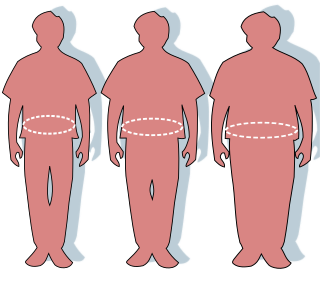
Obesity is a medical condition, sometimes considered a disease, in which excess body fat has accumulated to such an extent that it can potentially have negative effects on health. People are classified as obese when their body mass index (BMI)—a person's weight divided by the square of the person's height—is over 30 kg/m2; the range 25–30 kg/m2 is defined as overweight. Some East Asian countries use lower values to calculate obesity. Obesity is a major cause of disability and is correlated with various diseases and conditions, particularly cardiovascular diseases, type 2 diabetes, obstructive sleep apnea, certain types of cancer, and osteoarthritis.
Internal medicine, also known as general medicine in Commonwealth nations, is a medical specialty for medical doctors focused on the prevention, diagnosis, and treatment of internal diseases in adults. Medical practitioners of internal medicine are referred to as internists, or physicians in Commonwealth nations. Internists possess specialized skills in managing patients with undifferentiated or multi-system disease processes. They provide care to both hospitalized (inpatient) and ambulatory (outpatient) patients and often contribute significantly to teaching and research. Internists are qualified physicians who have undergone postgraduate training in internal medicine, and should not be confused with "interns", a term commonly used for a medical doctor who has obtained a medical degree but does not yet have a license to practice medicine unsupervised.
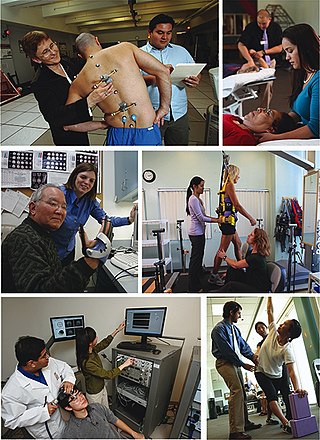
Kinesiology is the scientific study of human body movement. Kinesiology addresses physiological, anatomical, biomechanical, pathological, neuropsychological principles and mechanisms of movement. Applications of kinesiology to human health include biomechanics and orthopedics; strength and conditioning; sport psychology; motor control; skill acquisition and motor learning; methods of rehabilitation, such as physical and occupational therapy; and sport and exercise physiology. Studies of human and animal motion include measures from motion tracking systems, electrophysiology of muscle and brain activity, various methods for monitoring physiological function, and other behavioral and cognitive research techniques.

Indapamide is a thiazide-like diuretic drug used in the treatment of hypertension, as well as decompensated heart failure. Combination preparations with perindopril are available. The thiazide-like diuretics reduce risk of major cardiovascular events and heart failure in hypertensive patients compared with hydrochlorothiazide with a comparable incidence of adverse events. Both thiazide diuretics and thiazide-like diuretics are effective in reducing risk of stroke. Both drug classes appear to have comparable rates of adverse effects as other antihypertensives such as angiotensin II receptor blockers and dihydropyridine calcium channel blockers and lesser prevalence of side-effects when compared to ACE-inhibitors and non-dihydropyridine calcium channel blockers.

Stephen Joel Barrett is an American retired psychiatrist, author, co-founder of the National Council Against Health Fraud (NCAHF), and the webmaster of Quackwatch. He runs a number of websites dealing with quackery and health fraud. He focuses on consumer protection, medical ethics, and scientific skepticism.

Medical education is education related to the practice of being a medical practitioner, including the initial training to become a physician and additional training thereafter.
The Declaration of Helsinki is a set of ethical principles regarding human experimentation developed originally in 1964 for the medical community by the World Medical Association (WMA). It is widely regarded as the cornerstone document on human research ethics.

The National Childhood Vaccine Injury Act (NCVIA) of 1986 was signed into law by United States President Ronald Reagan as part of a larger health bill on November 14, 1986. NCVIA's purpose was to eliminate the potential financial liability of vaccine manufacturers due to vaccine injury claims to ensure a stable market supply of vaccines, and to provide cost-effective arbitration for vaccine injury claims. Under the NCVIA, the National Vaccine Injury Compensation Program (NVICP) was created to provide a federal no-fault system for compensating vaccine-related injuries or death by establishing a claim procedure involving the United States Court of Federal Claims and special masters.
Multimorbidity, also known as multiple long-term conditions (MLTC), means living with two or more chronic illnesses. For example, a person could have diabetes, heart disease and depression at the same time. Multimorbidity can have a significant impact on people's health and wellbeing. It also poses a complex challenge to healthcare systems which are traditionally focused on individual diseases. Multiple long-term conditions can affect people of any age, but they are more common in older age, affecting more than half of people over 65 years old.
The American Board of Internal Medicine (ABIM) is a 501(c)(3) nonprofit, self-appointed physician-evaluation organization that certifies physicians practicing internal medicine and its subspecialties. The American Board of Internal Medicine is not a membership society, educational institution, or licensing body.
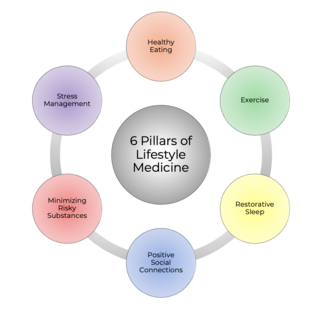
Lifestyle medicine (LM) is a branch of medicine focused on preventive healthcare and self-care dealing with prevention, research, education, and treatment of disorders caused by lifestyle factors and preventable causes of death such as nutrition, physical inactivity, chronic stress, and self-destructive behaviors including the consumption of tobacco products and drug or alcohol abuse. The goal of LM is to improve individuals' health and wellbeing by applying the 6 pillars of lifestyle medicine (nutrition, regular physical activity, restorative sleep, stress management, avoidance of risky substances, and positive social connection) to prevent chronic conditions such as cardiovascular diseases, diabetes, metabolic syndrome and obesity.
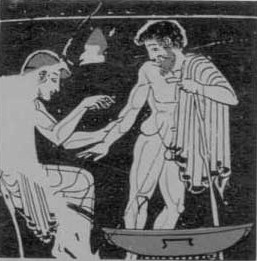
Iatrogenesis is the causation of a disease, a harmful complication, or other ill effect by any medical activity, including diagnosis, intervention, error, or negligence. First used in this sense in 1924, the term was introduced to sociology in 1976 by Ivan Illich, alleging that industrialized societies impair quality of life by overmedicalizing life. Iatrogenesis may thus include mental suffering via medical beliefs or a practitioner's statements. Some iatrogenic events are obvious, like amputation of the wrong limb, whereas others, like drug interactions, can evade recognition. In a 2013 estimate, about 20 million negative effects from treatment had occurred globally. In 2013, an estimated 142,000 persons died from adverse effects of medical treatment, up from an estimated 94,000 in 1990.
A medical journal is a peer-reviewed scientific journal that communicates medical information to physicians, other health professionals. Journals that cover many medical specialties are sometimes called general medical journals.
Bullying in the medical profession is common, particularly of student or trainee physicians. It is thought that this is at least in part an outcome of conservative traditional hierarchical structures and teaching methods in the medical profession which may result in a bullying cycle.
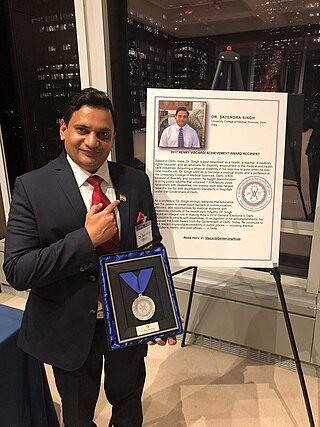
Dr Satendra Singh is a medical doctor at the University College of Medical Sciences and Guru Tegh Bahadur Hospital, Delhi. A physiologist by profession, Singh contracted poliomyelitis at the age of nine months but went on to complete a Bachelor of Medicine, Bachelor of Surgery from Ganesh Shankar Vidyarthi Memorial Medical College, Kanpur and later on Doctor of Medicine in Physiology. He is the first-ever Indian to win the prestigious Henry Viscardi Achievement Awards given to extraordinary leaders in the global disability community.

Health information on the Internet refers to all health-related information communicated through or available on the Internet.
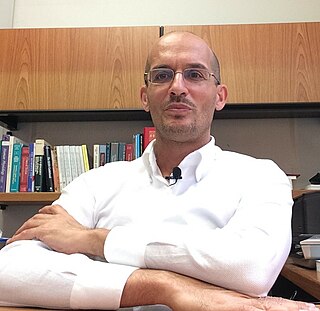
Luigi Fontana is a physician scientist who studies healthy longevity, with a focus on calorie restriction, endurance exercise and metabolism. He is the Leonard P Ullmann Chair in Translational Metabolic Health at the Charles Perkins Centre, where he directs the Charles Perkins Centre Royal Prince Alfred Clinic and the CPC RPA Health for Life Research, Educational and Clinical Program. He is also a professor of medicine and nutrition in the Faculty of Medicine and Health at the University of Sydney and a clinical academic in the Department of Endocrinology at the Royal Prince Alfred Hospital in Sydney, Australia. Fontana was a professor of medicine and co-director of the Healthy Longevity Program at Washington University School of Medicine.

Carolyn M. Mazure is an American psychologist and the Norma Weinberg Spungen and Joan Lebson Bildner Professor of Psychiatry and Psychology at the Yale School of Medicine. She created and directs Women’s Health Research at Yale — Yale’s interdisciplinary research center on health and gender.
Bonnielin Swenor is an American epidemiologist who is the endowed professor of disability health and justice and director of the Johns Hopkins University Disability Health Research Center. Her work uses data-driven approaches to advance equity for people with disabilities and change public perceptions of disability, away from "living with disability" and toward "thriving with a disability".












